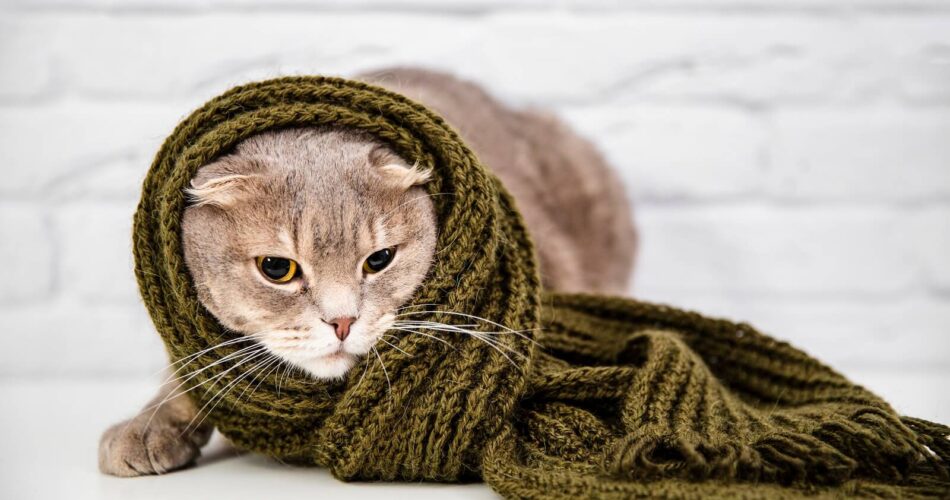Sneezing, runny noses, runny eyes, sniffles, fever…yes, you guessed it – it is flu season. During colds and flu season, cat parents are puzzled by one of the most popular questions – can cats catch colds from humans. Of course, the problem works in the opposite direction as well – can we get colds from our cats? Basically, can we get each other infected? The general answer is no. Cat colds are contagious but just for other cats like human colds are contagious just for humans. However, in rare situations, cats can catch a cold from humans.
Catching a cold – what does it mean?
It is a popular misconception that people catch cold by getting wet feet or staying too long in icy conditions. When we catch a cold, we are, in fact, becoming infected with a virus. Which type of virus is a whole new topic – more often than not, it can be a respiratory syncytial virus, a rhinovirus, a coronavirus, or a parainfluenza virus. These viruses are usually transmitted to us by other infected people. Being exerted, tired, stressed, or having an allergy increases our chances of catching a cold.
With that being explained, it is only natural for us to wonder can cats catch colds from humans? One might even wonder do cats get colds like humans? Well, in most cases, cats CANNOT catch a cold from humans. Yes, they get colds, but not the same colds as humans.
The reason cat and people do not get each other sick with colds is that the viruses responsible for causing the colds are host specific. It is easier to understand the concept of host specificity by imagining the viruses as keys and the hosts as locks. Different viruses are like differently shaped keys, and they can only be paired with a suitable lock.
However, in some infrequent circumstances, the answer to – can cats catch colds from humans is actually yes. Once again, such cases are sporadic. Recent studies have shown that domestic cats and certain exotic cat breeds can catch human colds based on what type of virus it is. For example, both domestic and exotic cats can catch the H1N1 virus (or swine flu) from humans as well as several other human cold viruses. So, if wandering can cats catch the flu from a human, the answer depends on the type of virus.

Do cats get colds or flu?
Yes, cats catch colds or flu in the forms of upper respiratory tract infections caused by two main viruses:
- The feline herpesvirus
- The feline calicivirus.
Both viruses affect cats of all ages, but young kittens, senior cats, and cats with compromised immunities are at higher risk. Cats can get colds or flu when in direct contact with another infected cat. This is particularly important for multiple cat households. If one cat is sick, to prevent the rest from contracting the virus, the sick cat should be isolated.
It is also worth mentioning that not only do cats get colds or flu, but once they become infected with one of the two above-listed viruses, the virus tends to stick around. Namely, even if the cat recovers, it remains a virus carrier. This indicates that the now apparently healthy cat is a source of infection – it sheds the virus in the environment. This shedding ability can be either temporary or permanent.
A cat with a cold or flu will likely exhibit the following signs and symptoms:
- Lethargy, depression, and reluctance to be physically active
- Coughing, sneezing, and sniffling
- Runny nose and runny eyes
- Pawing and scratching the nose and eyes
- Painful lesions on the eyes, nose, and inside the mouth
- Fever
- Decreased or completely lost appetite
- Reduced water intake and dehydration
- Difficulty breathing (open mouth breathing).
Keep in mind that having a wet nose is not the same as having a runny nose.

How can I help my cat?
The best way to help your cat is by taking it to the vet’s office. If left untreated, the condition can progress into life-threatening pneumonia in a matter of days.
While following the vet’s instructions and sticking to the prescribed medications, there are specific ways in which you can help your cat and make it go through the cold or fly more comfortably.
For example, if your cat is congested, consider removing the discharge and keeping the nasal passages and eyes clean. To increase the humidity, you can even use a vaporizer.
The next thing you can do is make sure your cat eats well and takes in enough water. When the nasal passages are clogged, the cat cannot smell, and its appetite is reasonably decreased. In such cases, force-feeding is recommended. If the cat eats on its own, check its food bowl frequently so you can keep track of the amount of food it is eating.
Last but not least, keep in mind that severe cases require hospitalization. In a hospital environment, cats with severe colds and flu will receive the supportive care they need, including fluid therapy, supplemental oxygen, and feeding tubes.
Conclusion
Cats can catch colds and flu, but they catch them from other cats and not from humans in almost all cases. Generally speaking, although the symptoms of cat colds and flu may seem scary, they are, in fact, transient and self-limiting. Namely, they tend to last sometime between seven and ten days. However, the long-term consequences are more serious – even with prompt and adequate treatment, the cold or flu virus remains in the cat’s system. Anyway, knowing that your cat did not get the cold from you is quite a relieving notion.

